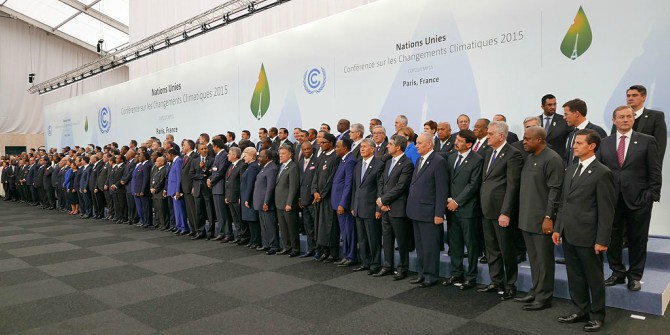
Recent attempts to advance international cooperation have shown the importance of a very well managed negotiation process. While the UN climate change negotiations in Copenhagen ended without official agreement in 2009, they got back on track one year later in Cancún and reached a global deal in Paris in 2015. The largest summit ever at that time, with 120 heads of state and government meeting in Denmark, Copenhagen had been unable to achieve a binding comprehensive agreement on a major looming global threat. The initial breakdown posed a serious risk to multilateral cooperation and led to billions of dollars of costs from delayed action on climate mitigation and adaptation.
The puzzle which arises is that negotiation outcomes differed despite the fact that fundamental constellations of power and interests remained largely the same in between the summits in Copenhagen and Cancún and later Paris. The US and all other major powers supported the final compromise package at all of these summits. Nevertheless, it fell through in first and agreement was only reached later, even so with a lower level of ambition. How could we explain these different outcomes?
We assume that the management of multilateral negotiations played a crucial role in attaining global cooperation. The 2009 Conference of Parties in Copenhagen ended without agreement in part because of poor management of the negotiations by the Danish host and the UNFCCC Secretariat. Significantly altered management practices a year later at COP16 in Cancun, Mexico, were a major factor in an agreement being reached. Compromises made at the previous summit in Copenhagen, which provided a framework for agreement, also played a significant role.
Current research suggests that the COP Presidency and UNFCCC Secretariat can make an important contribution to achieving a successful negotiation outcome. Comparing statements of senior negotiators and officials on the two summits under the Danish and the Mexican presidency reveals the following four factors of influence on successful outcomes:
1) Creating a transparent and inclusive process: Transparency and inclusivity are crucial to ensure that all parties understand the negotiation process and its content. This enhances their ability to contribute and to compromise. It also reduces the possibility that parties attempt to obstruct negotiations because of procedural issues. Transparency and inclusivity also encourage all parties to feel they are being treated with respect by the organisers.
2) Ensuring the capabilities of the organising institutions and individuals: Organisational cohesion within and between the Presidency and the UNFCCC Secretariat plays a key role in successful COPs. Individuals with key organisational roles, for example the President, the Head of the UNFCCC Secretariat and their advisors, must have expert understanding of the negotiation process, as well as being skilled networkers and communicators. This enables them to navigate complex negotiations more effectively and widens their access to delegates.
3) Securing broad acceptance of the COP President from key negotiators: Building acceptance and trust in the authority of the COP President engenders a sense of goodwill among parties and empowers the President with sufficient leeway to take crucial decisions. It also reduces the potential for parties to block decisions.
4) Enabling constructive arguing: Building a sense of trust towards the organisers and among the parties involved, and providing informal negotiation spaces enables constructive arguing. Organisers from host nations and the UNFCCC Secretariat can thereby facilitate constructive arguing that lets negotiators from different parties mutually reveal information about the interests that underlie their positions and provide a rationale for possible solutions. By doing so, constructive arguing allows those involved in negotiations to consider interests more comprehensively and to craft a deal that is acceptable to all. It can also make parties more amenable to new solutions and compromises.
Wider research on the regimes of trade and biosafety shows striking parallels in the dynamics of environmental and economic negotiations: they all demonstrate that effective negotiation management significantly enhances cooperation and, in doing so, contributes to a successful process and outcome, from trade negotiations in Doha in 2001 to biosafety negotiations in Montreal in 2000.
By contrast, poor negotiation management can be a contributing factor in the collapse of negotiations, seen at the breakdowns of the trade negotiations in Seattle and the biosafety summit in Cartagena, both in 1999. These summits either completely failed to reach agreement or reached a political agreement only that was not accepted by all parties. The results cost many countries dearly in environmental, economic, and social terms.
Considering the importance of effective multilateral negotiations, we founded an institution to share these findings with the organisers of multilateral summits: The Centre for Multilateral Negotiations. The aim of the Centre is to provide knowledge on the issues presented and therefore contribute to the success of international negotiations. Workshops with the governments of Fiji, Argentina and Morocco were held in order to prepare them for the task of establishing a constructive negotiation environment at the respective UN climate and WTO trade summits.
Negotiations, it proves, are not a coincidental process that depends mainly on circumstances. Negotiations are conducted by individuals who will best work in transparent, inclusive environments together with people they trust. Keeping that in mind and learning about existent shortfalls will ensure better results of international negotiations in future.
♣♣♣
Notes:
- This blog post is based on the author’s paper The ‘power of process:’ how negotiation management influences multilateral cooperation, International Negotiation, 21 (3). pp. 345-380. ISSN 1382-340X
- The post gives the views of the authors, not the position of LSE Business Review or the London School of Economics.
- Featured image credit: COP21 participants, 30 Nov 2015, by Presidencia de la República Mexicana, under a CC BY 2.0 licence, via Wikimedia Commons
- When you leave a comment, you’re agreeing to our Comment Policy.
 Kai Monheim is the Director and Managing Partner of the Centre for Multilateral Negotiations, which he started in September 2015. He received his PhD from LSE on the topic of Multilateral Negotiations. He researched the key variables in the negotiation process contributing to the regime formation of climate change, trade, and biosafety. Kai also holds a Master in Public Policy from Harvard Kennedy School, and a law/bar school degree from Humboldt Universität in Berlin, Germany. He previously worked as a Project Leader with The Boston Consulting Group and is currently a Visiting Fellow at the Grantham Research Institute on Climate Change and the Environment at LSE. He is trained as a mediator and works in political, business, and family mediation.
Kai Monheim is the Director and Managing Partner of the Centre for Multilateral Negotiations, which he started in September 2015. He received his PhD from LSE on the topic of Multilateral Negotiations. He researched the key variables in the negotiation process contributing to the regime formation of climate change, trade, and biosafety. Kai also holds a Master in Public Policy from Harvard Kennedy School, and a law/bar school degree from Humboldt Universität in Berlin, Germany. He previously worked as a Project Leader with The Boston Consulting Group and is currently a Visiting Fellow at the Grantham Research Institute on Climate Change and the Environment at LSE. He is trained as a mediator and works in political, business, and family mediation.





